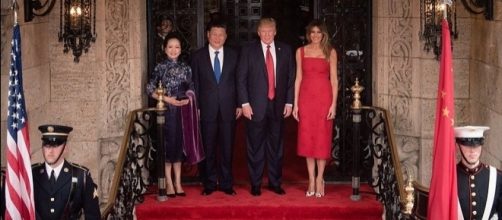US President Donald Trump and Chinese President Xi Jinping had a telephone conversation to discuss strategies on how to dissuade North Korea from precipitating a crisis. The leaders want a Korean peninsula that is free of nuclear weapons. That is the gist of the phone call as confirmed by White House and also in the Chinese state television.
It may be recalled that United States President Donald Trump had broached the subject of North Korea with his Chinese counterpart when the two had met in Florida in April 2017. Trump felt that, since china was an ally of North Korea, it could play a major role to convince Pyongyang to put an end to its nuclear ambitions.
However, Trump did not get the expected response and North Korea went ahead in its mission to perfect an ICBM.
The new strategy
Fox News reports that Xi Jinping requested both America and North Korea to tone down their statements and avoid any action that could add to tensions in the region. The White House has said that both Trump and Xi are committed to denuclearizing the Korean Peninsula and have agreed that North Korea must mend its ways.
Donald Trump wanted China to exert pressure on North Korea so that it halts its nuclear weapons program. With every passing day, it continues to test its missiles and claims improved performance. It is gradually acquiring the capability to target the United States, therefore, Trump wants China to involve and defuse the situation.
His logic is that China is the biggest economic partner and source of aid for Pyongyang and has to now evolve a line of action of how it can persuade Pyongyang to end its nuclear programs.
Incidentally, Donald Trump and Xi Jinping are scheduled to meet later this year. The trip had been announced in April, and has, since, been confirmed by the Chinese Foreign Minister.
How is the dice loaded?
Reacting to the growing signs of instability in the region, Japanese Prime Minister Shinzo Abe has pledged to protect his nation’s people because North Korea has announced that it would send its missiles over Japan and on to Guam to attack the United States. The Defense Ministry of Japan has informed that it would deploy an adequate number of interceptors in western Japan to respond to a possible risk of fragments falling from missiles.
Threats and counter threats from America and North Korea have created confusion. American warships are already positioned in the vicinity and it is not known whether Pyongyang is readying its weapons to launch an offensive. The outcome would depend on how China would respond. It has indicated that it would remain neutral which could influence the decision of Pyongyang. If the support of its main ally is not forthcoming, it would have to think twice before launching any action.
Anyway, the threat of a possible nuclear war has led to an increase in the demand of bomb shelters. The Sacramento Bee reports that a Montebello based company in Los Angeles is marketing bomb shelters priced from $10,000 to $100,000.
These shelters are designed to be buried 20 feet below ground and can sustain survivors for up to one year, depending on the size and model. So far, more than 30 units have been sold and some of these have gone to Japan.


